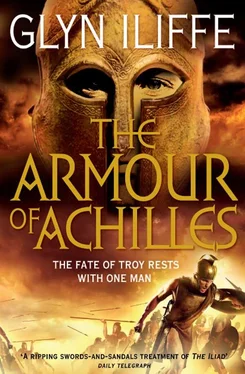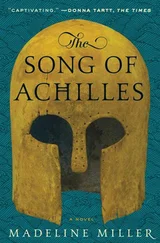Glyn Iliffe - The Armour of Achilles
Здесь есть возможность читать онлайн «Glyn Iliffe - The Armour of Achilles» весь текст электронной книги совершенно бесплатно (целиком полную версию без сокращений). В некоторых случаях можно слушать аудио, скачать через торрент в формате fb2 и присутствует краткое содержание. Год выпуска: 0101, ISBN: 0101, Издательство: Pan Books, Жанр: Старинная литература, на английском языке. Описание произведения, (предисловие) а так же отзывы посетителей доступны на портале библиотеки ЛибКат.
- Название:The Armour of Achilles
- Автор:
- Издательство:Pan Books
- Жанр:
- Год:0101
- ISBN:9781447205098
- Рейтинг книги:4 / 5. Голосов: 1
-
Избранное:Добавить в избранное
- Отзывы:
-
Ваша оценка:
- 80
- 1
- 2
- 3
- 4
- 5
The Armour of Achilles: краткое содержание, описание и аннотация
Предлагаем к чтению аннотацию, описание, краткое содержание или предисловие (зависит от того, что написал сам автор книги «The Armour of Achilles»). Если вы не нашли необходимую информацию о книге — напишите в комментариях, мы постараемся отыскать её.
The Armour of Achilles — читать онлайн бесплатно полную книгу (весь текст) целиком
Ниже представлен текст книги, разбитый по страницам. Система сохранения места последней прочитанной страницы, позволяет с удобством читать онлайн бесплатно книгу «The Armour of Achilles», без необходимости каждый раз заново искать на чём Вы остановились. Поставьте закладку, и сможете в любой момент перейти на страницу, на которой закончили чтение.
Интервал:
Закладка:
‘I want you to do something for me, Omeros.’
‘Yes, of course.’
‘I want you to give a message to Odysseus. I want you to give it to him in person, when he’s alone.’
‘Me? But Eurybates is Odysseus’s squire. Wouldn’t he . . . ?’
‘No, I want you to give it to him. Eurybates has spent the past ten years in Ilium; what can he tell Odysseus about Ithaca? But you’ve seen everything that’s happened here these past ten years. You can let him know everything that’s happened while he’s been away, in all the detail he could want. More importantly, you can tell him about Telemachus: how tall he’s getting, how strong he is, and how he’s always talking about his father. Tell him that . . .’
She paused. They could see the harbour below them now, where the two galleys had their sails furled, ready for the morning departure. Penelope stood watching them as they rolled gently on the black, starlit waves that swept in from the straits. Across the water was the vast bulk of Samos.
‘Tell him that sometimes I look at Telemachus and see Odysseus staring back out at me. And sometimes I can’t bear it. I want him back, Omeros.’
She turned to face him, and though her face was in darkness he could see the tears glistening in her eyes. He took her cold hand and pressed the palm, trying to offer reassurance and yet not knowing how to comfort a queen.
‘The gods will bring him back.’
‘The gods are fickle,’ she replied. ‘And yet I still pray and hope. When I saw those galleys a moment ago, I imagined they were his and that he had come home at last. I could almost see him climbing the road from the harbour, as if the past ten years had been an awful nightmare and that he had returned. But this isn’t a nightmare; it’s reality, and Odysseus is in a darkness that’s beyond my reach.’
Omeros lowered his eyes.
‘I’ll tell him for you,’ he promised. ‘I’ll tell him all about Telemachus and how much he needs his father. And I’ll tell him about you, how much you love him and need him.’
‘Thank you, Omeros,’ Penelope said, laying her hand on his arm. ‘But there’s something else you must make clear to him, something I will entrust to you alone. Tell Odysseus his kingdom is under threat again.’
Omeros’s eyes widened briefly, before settling into a frown.
‘If that’s true, then the ships should remain here. While you or Ithaca are in danger, our first duty is to defend you. It’s what Odysseus would have us do.’
‘No. If Eurybates and Arceisius don’t return he’ll fear the worst and do something rash. Tell him we’re safe for now, but the threat will grow the longer he is away. It’s Eupeithes again.’
‘Eupeithes!’
‘Yes. His influence has increased in Odysseus’s absence, but never such that he could be a threat. The Kerosia has always been too heavily weighted against him. He bought Polyctor’s support long ago, but he’ll never win over the rest of the council.’
‘Then what has changed?’ Omeros asked.
‘The arrival of the galleys was the catalyst,’ Penelope replied. ‘Before then, the people thought the war could not last much longer, but the call for replacements has crushed their hope. Now they are wondering if Odysseus will ever return, and with some of the nobles refusing to send their sons to Troy, Eupeithes’s confidence has grown. He’s pushing for his son – Antinous – to be added to the Kerosia, as a favour for persuading the nobles not to rebel. He won’t be allowed – not yet – but if he can gain support among some of the richest families we’ll find it hard to resist for ever.’
‘Will he try force again?’
Penelope shook her head.
‘Not outright: he lost his taste for that the last time. He’ll stick to what he’s best at – politics of the worst kind – and though I will defend my husband’s kingdom in every way I can, I’m not sure how long I can outwit a resurgent Eupeithes for. If he can somehow take control of the Kerosia, with me as titular head of Ithaca, he will be ruler of Ithaca in all but name. Omeros, you must tell Odysseus that if the war isn’t over soon he could lose his kingdom altogether.’
Omeros nodded and looked out at the wooded slopes of Samos across the water. If he ever saw his homeland again, he had a feeling it would not be the same place it was now.
Chapter Nine
C ALCHAS
The sun was low in the west before Odysseus and Eperitus dismissed the replacements. The inspection had been delayed by Odysseus’s report to Agamemnon, where his news of victory had been questioned at great length by the King of Men, aided by Menelaus and Nestor. Now, as the men began to stream back from the beach and into the camp where the rest of the army were preparing their evening meals, the king of Ithaca and the captain of his guard stood looking at the Aegean Sea beyond the black hulks of the Greek fleet, contemplating the merits of the newcomers.
‘There’s not a man among them who’s fit enough yet,’ Odysseus said, his face sober with concern. ‘Those mercenaries will flag in a prolonged battle, but the lads from home wouldn’t even make it through a skirmish.’
‘They’ve been crammed on to those galleys for days,’ Eperitus replied. ‘It’s bound to have left them a bit weak and groggy. But I’ll make sure they’re put through their paces over the next few days.’
‘They need more weapons training, too,’ Odysseus added, looking up at the pink skies scored with lines of purple cloud as if great claws had been drawn across the heavens. ‘The hired men will be able to stand their ground, but from what we saw of the others the Trojans would cut them to pieces without breaking into a sweat.’
‘Did we expect anything else?’ Eperitus asked, raising an eyebrow and grinning at his friend as they turned and walked back in the direction of the camp. ‘But don’t worry – I’ll see they know how to fight, too, before we inflict them on the enemy. Besides, I’d trust our own countrymen more than I would those mercenaries. At least they have a sense of loyalty and honour.’
‘What good’s honour in this place?’ Odysseus said. ‘Omeros was right: remembering who we were and what we’ve left behind is the only thing that’s going to win this war – that and ruthless determination.’
‘Honour is the lifeblood of a fighting man,’ Eperitus protested. ‘Without it we’re nothing more than murdering brigands. You’re a king, Odysseus, you should know that.’
‘I’m a king of nothing unless this war finishes soon. And the longer we fight the Trojans the more our sense of honour and humanity is dying out anyway. You saw how the men were by the time we sacked Thebe – brutal and merciless, like wild animals. I’ve watched it growing in them as the years have passed, and the Trojans are no better. It’s despicable, but perhaps we have to abandon our notions of honour and become the worst kind of savages if we’re ever to see our homes again.’
‘If that’s what’s needed, then perhaps it’s best we never return to Ithaca at all,’ Eperitus said.
They walked between the weathered tents where the men were seated around small fires, eating smoked mackerel and bread washed down with wine from home. Eperitus looked at the new arrivals, sitting in twos and threes among the men for whom Ithaca was nothing more than a faded memory dressed up in nostalgia. For a short while they would listen to news from their homeland, of their loved ones and of the places they had once known as intimately as they knew their own bodies. Then the wine that had been fermented on Samos would help them forget and instead they would tell the newcomers stories of the war against Troy and of the kings and heroes whose names were already becoming legend. How long, Eperitus wondered, before the newcomers would also lose their identities as Greeks? How long before they became longhaired barbarians, carrying captured weapons and married to foreign wives who spoke a different tongue? How long before their honour faded and was stained with acts of black cruelty?
Читать дальшеИнтервал:
Закладка:
Похожие книги на «The Armour of Achilles»
Представляем Вашему вниманию похожие книги на «The Armour of Achilles» списком для выбора. Мы отобрали схожую по названию и смыслу литературу в надежде предоставить читателям больше вариантов отыскать новые, интересные, ещё непрочитанные произведения.
Обсуждение, отзывы о книге «The Armour of Achilles» и просто собственные мнения читателей. Оставьте ваши комментарии, напишите, что Вы думаете о произведении, его смысле или главных героях. Укажите что конкретно понравилось, а что нет, и почему Вы так считаете.












